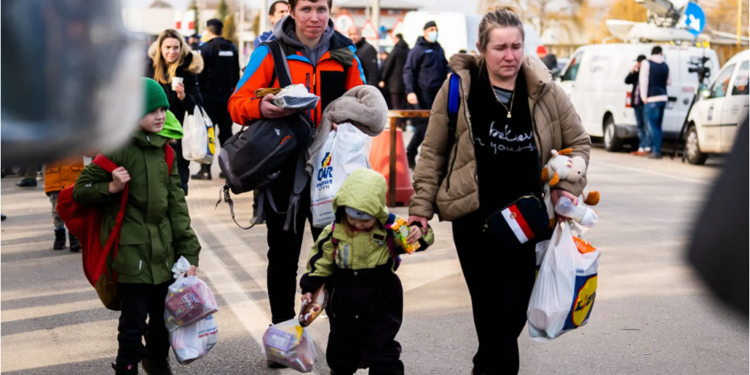We tried to respond to all needs: Filantropia Federation, a year of assistance for Ukrainian refugees


Yesterday, 24 February, marked one year since the start of the war in Ukraine and the beginning of the population exodus from Romania’s neighbouring country. Nevertheless, representatives of the Filantropia Federation of the Romanian Patriarchate continue to provide assistance.
“We tried to respond to all the needs,” said Father Ciprian Ioniță, patriarchal adviser and president of the philanthropic federation of the Romanian Orthodox Church.
“It was a year where we had challenges and tried to meet all the needs. We are still running projects with refugees,” the patriarchal adviser added.
“We continue to give hot meals to all refugees entering our country at the Siret border crossing. In addition, with the assistance of International Orthodox Christian Charities (IOCC), we provide refugees still in Romania with 600 lei coupons.”
Last year, the initiatives implemented in partnership with IOCC provided support worth 5.3 million lei. The previous year’s contributions for border dioceses within the Romanian Patriarchate amounted to an additional 275 thousand euros.
Today, in Iași, where 2,000 Ukrainians reside with private persons, Filantropia Federation is implementing a project that provides children, accompanied by their mothers, grandmothers, or aunts, with tours to tourist attractions in the Archdioceses of Iași, and Suceava and Bukovina.
Two hundred seventy children have benefited from this project so far, Father Ciprian Ioniță noted.
The annual report summarising the activities of the Romanian Orthodox Church in 2022 presents figures regarding the support offered to Ukrainian refugees: its value is equivalent to 8.7 million euros.
The Diocese of Southern Bessarabia, which has five border crossings with Ukraine, sponsored refugees in the amount of 1.5 million euros on its own.
The aid included round-the-clock assistance for refugees at border crossing points, more than 13,000 accommodations and more than 600 humanitarian aid transports, almost a third of which also reached Ukraine and the Republic of Moldova.
Republic of Moldova, the country having the most number of refugees per capita
The dioceses of the Romanian Patriarchate in the Republic of Moldova carry out programmes for the country’s numerous refugees.
The Republic of Moldova has received the highest proportion of refugees relative to its population since the beginning of the war: over 4% of the country’s population, which surpasses its capacity to meet their requirements.
More than 111,000 migrants entered the Republic of Moldova in March alone, but the state’s ability to sustain them was barely 15,000.
Hence, three-quarters of the refugees, 80 per cent of whom were children, were welcomed into the homes of Bessarabian families, who provided them with free support.
The Diaconia Social Mission of the Metropolis of Bessarabia was at the forefront of support efforts. Between March and August 2022, it provided volunteers and a support centre at the Criva border crossing point, which helped 2,259 people, including 411 children.
The organisation delivered approximately 120 tonnes of supplies to 89 refugee shelters last year. In addition, the organisation provided and distributed packages to over 54,000 individuals and shipped two batches of nearly 7 tonnes of products to Odesa and three more to Chernivtsi.
The non-formal education project Ludobus, which reaches rural communities, and the two educational centres opened last year—the Anastasis Educational Centre in Balti and the Multifunctional Centre for Children and Families “St. Anne” in Chisinau—provide socialisation and counselling services of various types, including psychological, for refugees and their children.
In partnership with the United Nations High Commissioner for Refugees (UNCHR), the Diaconia Social Mission also provided a financial support programme for more than 96,000 refugees.
Photography courtesy of the Archdiocese of Suceava and Rădăuți / Irina Ursachi
Source: basilica.ro





